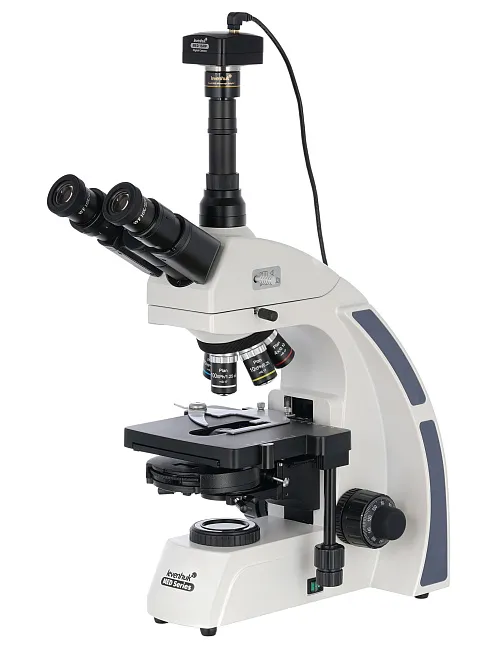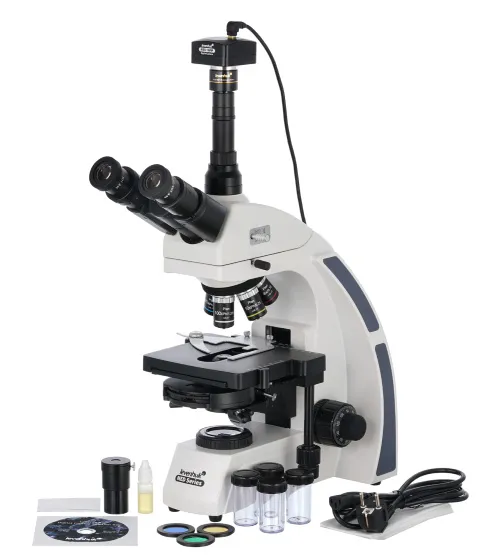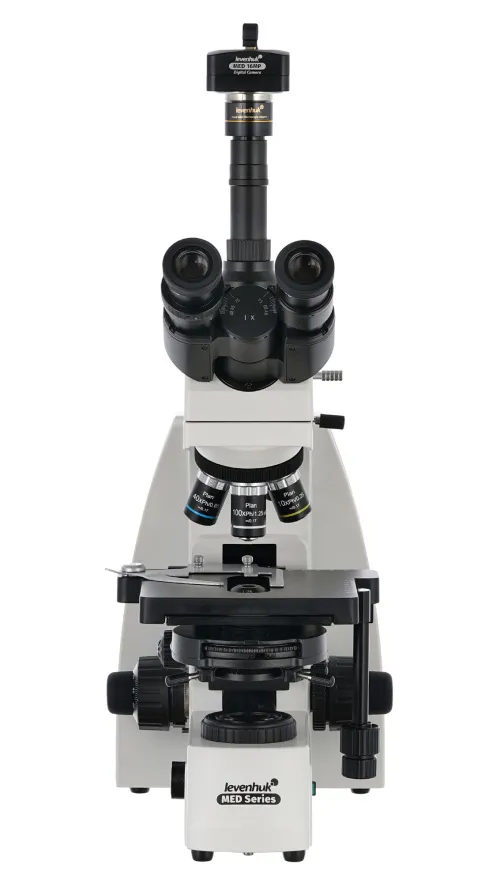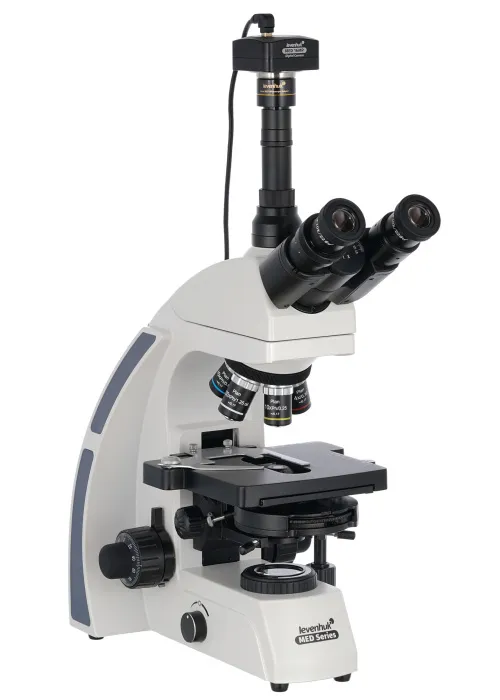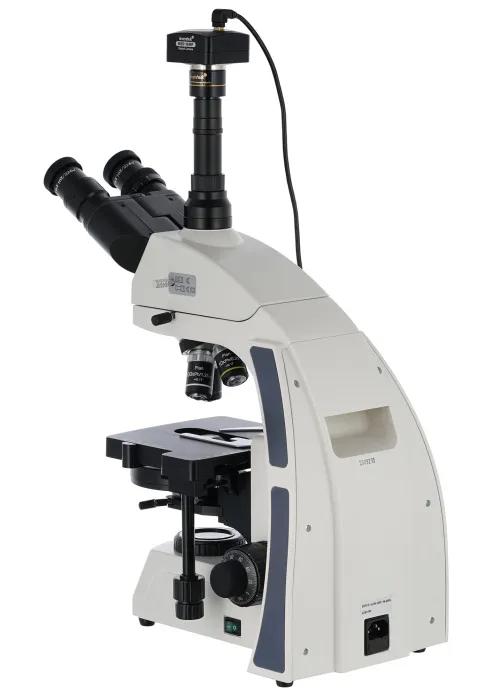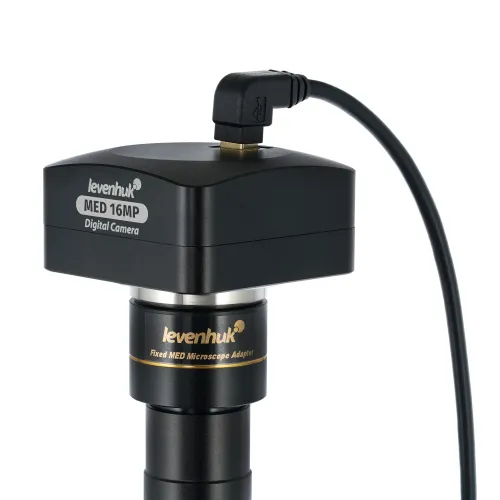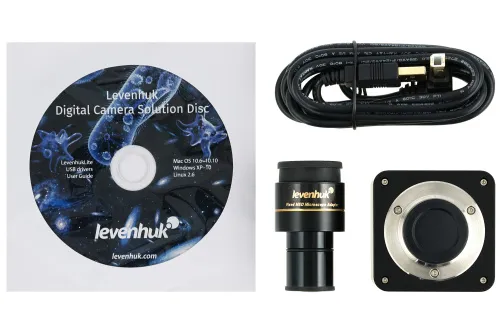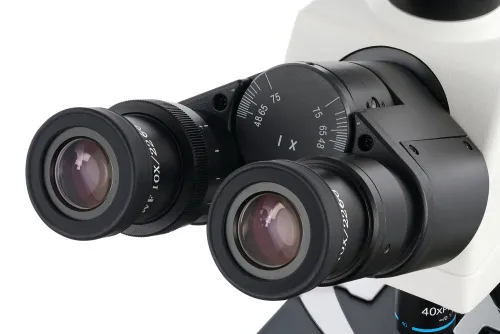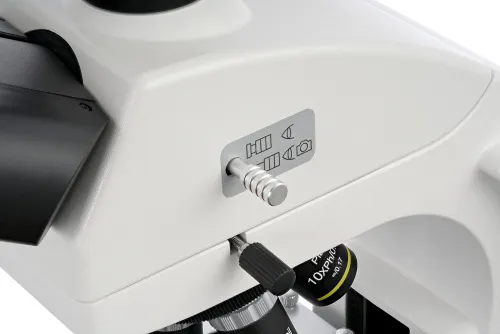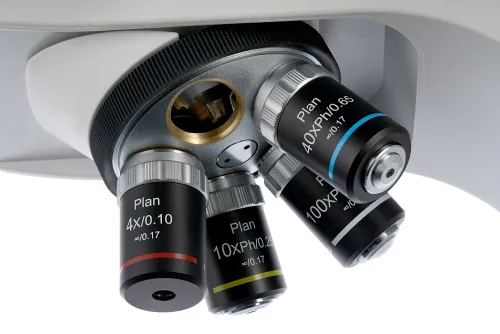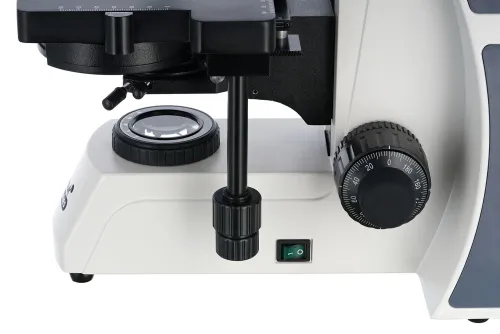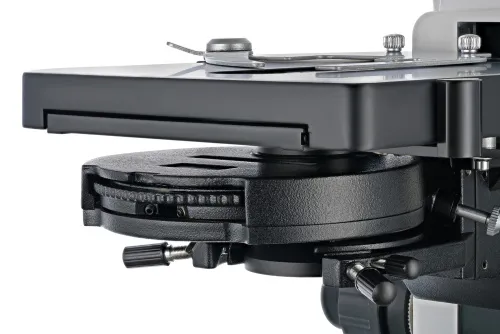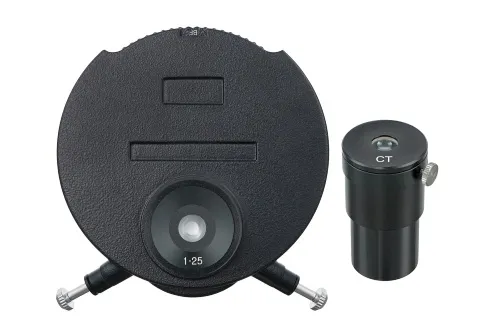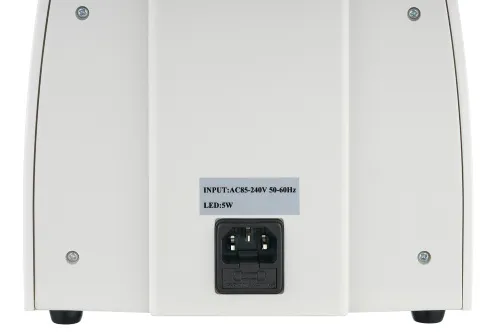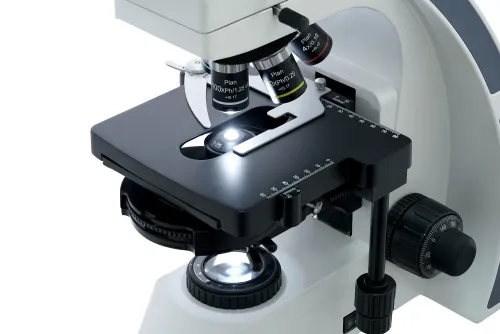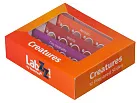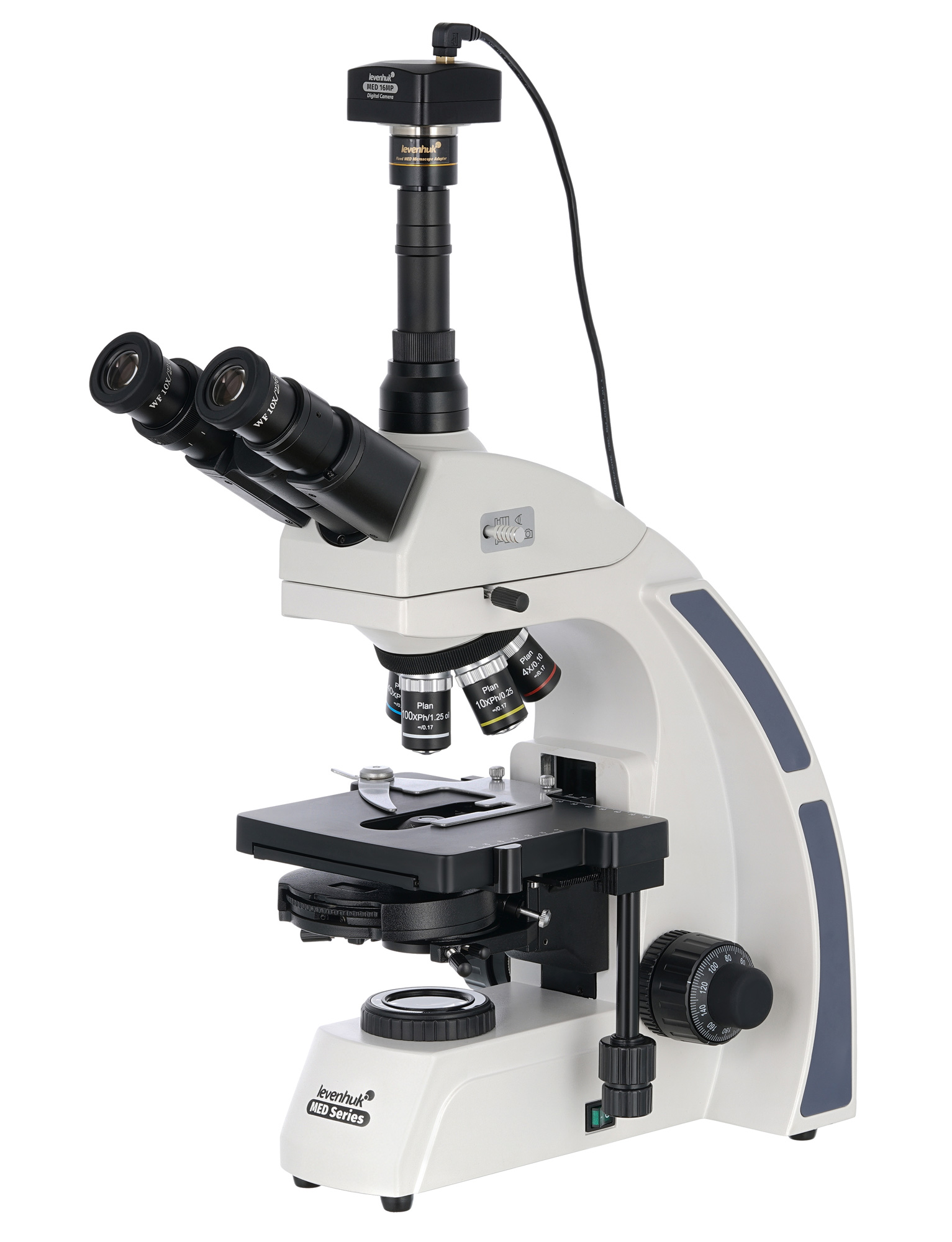Levenhuk MED D45T Digital Trinocular Microscope
Magnification: 40x to 1000x. Trinocular head, a 16 MP digital camera, infinity-corrected phase contrast plan achromatic objective lenses, a phase contrast condenser (dark field)
| Product ID | 74010 |
| Brand | Levenhuk, Inc., USA |
| Warranty | lifetime |
| EAN | 5905555005089 |
| Package size (LxWxH) | 50x43x28 cm |
| Shipping Weight | 10.5 kg |
Levenhuk MED D45T trinocular microscope is equipped with a 16 MP digital camera that allows for taking high-resolution photos and videos. The microscope is suitable for phase contrast observations as well as for bright field and dark field ones. It is the perfect asset for a clinical diagnostic center, biochemical laboratory, or microbiological laboratory. The microscope has a provision or Köhler illumination adjustment; all observations are made with a magnification of 40x to 1000x.
The microscopes in the Levenhuk MED 45 series are equipped with an infinity-corrected optical system that is used in professional and high-class microscopes. This system includes Infinity PlanAchromat objectives and allows for obtaining clear, high contrast images with a high level of flatness.
One of the most important features of an infinity-corrected optical system is that it allows for installing any additional parts in the optical path between objective lenses and an ocular tube. The additional parts include polarizers and epi-fluorescence light. All in all, modular design and simple operation make Levenhuk MED 45 optimal microscopes for use in different kinds of microscopy and working in hematological, histological, microbiological, and other laboratories.
The trinocular head consists of the binocular visual part inclined by 30 degrees and the vertical eyepiece tube where the digital camera is positioned. The kit includes a camera with a 16 MP sensor. It can be used to transmit images from the objective to an external screen as well as to take photos of specimens and videos of studies. The camera is connected to the PC via a USB cable included in the kit. In addition, image editing software can be installed from the disc.
Optical accessories include phase contrast plan achromatic objective lenses of various magnification and 10x wide field eyepieces with diopter adjustment. Objective lenses 40x and 100x are fitted with spring rims that protect the optics from incidental damage. The optical system produces clear and high-contrast images without chromatic aberration. A 100x objective lens is used for oil immersion. All accessories are made of optical glass with anti-fungal coating.
The double-coordinate stage has a mechanical scale that helps to promptly and accurately place specimens under the objective. Coarse and fine focusing is available. Köhler illumination adjustment is available. An LED light is located at the bottom and has a brightness adjustment. The phase contrast condenser can be used for dark field studies by the “dry” method.
The light is powered by an AC power supply.
Features:
- Trinocular head, magnification range of 40x to 1000x
- Infinity-corrected phase contrast plan achromatic optical system
- Wide-field eyepieces with diopter adjustment
- Phase contrast condenser with dark field
- Lower LED light with brightness adjustment
- Köhler illumination is available
- 16MP digital camera is included
The kit includes:
- Microscope base with a stand
- 360° rotatable trinocular head
- Infinity-corrected phase contrast plan achromatic objective lenses: 4x, 10x, 40xs, 100xs (oil) with anti-fungal coating
- Wide-field eyepieces: WF10x/22mm with anti-fungal coating (2 pcs)
- Phase contrast device (dark field)
- Filters: blue, green, yellow
- Bottle of immersion oil
- LED (5 W)
- Fuse (2 pcs)
- Power cord for microscope
- Dust cover
- 16MP digital camera
- Camera adapter
- Camera mount
- USB cable for connecting and charging the camera
- CD with software and drivers
- User manual and lifetime warranty
Caution:
Please refer to the specifications table for the correct mains voltage and never attempt to plug a 110V device into 220V outlet and vice versa without using a converter. Remember that mains voltage in the U.S. and Canada is 110V and 220–240V in most European countries.
Some things you can see under a microscope:





Levenhuk MED D45T Digital Trinocular Microscope is also compatible with other Levenhuk digital cameras (additional cameras are purchased separately). Levenhuk cameras are installed in the eyepiece tube instead of an eyepiece. This microscope is also compatible with any other digital microscope cameras.
| Product ID | 74010 |
| Brand | Levenhuk, Inc., USA |
| Warranty | lifetime |
| EAN | 5905555005089 |
| Package size (LxWxH) | 50x43x28 cm |
| Shipping Weight | 10.5 kg |
| Type | biological, light/optical, digital |
| Microscope head type | trinocular |
| Optics material | optical glass with anti-fungal coating |
| Head | 360 ° rotatable |
| Head inclination angle | 30 ° |
| Magnification, x | 40 — 1000 |
| Eyepiece tube diameter, mm | 23.2 mm (third vertical tube), 30mm (binocular head) |
| Eyepieces | WF10x/22mm (2 pcs.) |
| Objectives | infinity-corrected phase contrast plan achromatic: 4x, 10x, 40xs, 100xs (oil) |
| Revolving nosepiece | for 5 objectives |
| Interpupillary distance, mm | 48 — 75 |
| Stage, mm | 180x150 |
| Stage moving range, mm | 75/50 (movement in horizontal (X and Y) directions) |
| Coarse focusing travel, mm | 48 |
| Stage features | mechanical double-layer |
| Eyepiece diopter adjustment, diopters | ±5 |
| Condenser | phase contrast (with dark field) |
| Focus | coaxial, coarse (0.5 mm) and fine (0.002 mm), with rack and pinion |
| Body | metal |
| Illumination | LED |
| Brightness adjustment | ✓ |
| Power supply | 100–240V |
| Light source type | 5W, 85–230 V AC |
| Light filters | blue, green, yellow |
| Additional | Köhler illumination, collector lens |
| User level | experienced users, professionals |
| Assembly and installation difficulty level | complicated |
| Application | laboratory/medical |
| Illumination location | lower |
| Research method | bright field, dark field, phase-contrast microscopy |
| Digital camera included | ✓ |
| Pouch/case/bag in set | dust cover |
| Maximum resolution | 4632x3488 |
| Megapixels | 16 |
| Sensor element | 1/2.33" |
| Pixel size, μm | 1.335x1.335 |
| Video recording | yes |
| Frame rate, fps at resolution | 11@1536x1160, 2@4632x3488, 8@2320x1740 |
| Image format | *.jpg, *.bmp, *.png, *.tif and others |
| Video format | output: *.wmv, *.avi, *.h264 (Windows 8 and later), *h265 (Windows 10 and later) |
| Spectral range, nm | 380–650 |
| White balance | automatic, manual |
| Exposure control | 0.2–2000μs |
| Usage location | the third 23.2mm ocular tube of the microscope |
| Software, drivers | LevenhukLite |
| Programmable options | brightness, image size, shutter time |
| Output | USB 3.0 |
| System requirements | Windows 8/10/11 (32 and 64 bit), Mac OS X, Linux, up to 2.8GHz Intel Core 2 or higher, minimum 2GB RAM, USB 3.0 port, CD-ROM |
| Camera power supply | via USB cable |
and downloads
We have gathered answers to the most frequently asked questions to help you sort things out
Find out why studying eyes under a microscope is entertaining; how insects’ and arachnids’ eyes differ and what the best way is to observe such an interesting specimen
Read this review to learn how to observe human hair, what different hair looks like under a microscope and what magnification is required for observations
Learn what a numerical aperture is and how to choose a suitable objective lens for your microscope here
Learn what a spider looks like under microscope, when the best time is to take photos of it, how to study it properly at magnification and more interesting facts about observing insects and arachnids
This review for beginner explorers of the micro world introduces you to the optical, illuminating and mechanical parts of a microscope and their functions
Short article about Paramecium caudatum - a microorganism that is interesting to observe through any microscope

